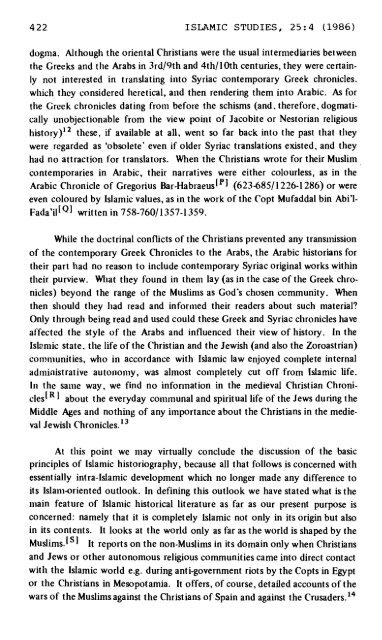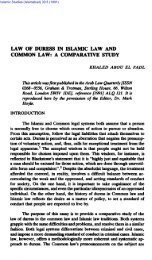ISLAMIC & WESTERN HISTORIOGRAPHY
ISLAMIC & WESTERN HISTORIOGRAPHY
ISLAMIC & WESTERN HISTORIOGRAPHY
You also want an ePaper? Increase the reach of your titles
YUMPU automatically turns print PDFs into web optimized ePapers that Google loves.
4 22 <strong>ISLAMIC</strong> STUDIES, 25:4 (1986)<br />
dogma. Although the oriental Christians were the usual intermediaries between<br />
the Greeks and the Arabs in 3rd/9th and 4th/lOth centuries, they were certainly<br />
not interested in translating into Syriac contemporary Greek chronicles.<br />
which they considered heretical, and then rendering them into Arabic. As for<br />
the Greek chronicles dating from before the schisms (and. therefore, dogmatically<br />
uiiobjectionable from the view point of Jacobite or Nestorian religious<br />
history)12 these, if available at all, went so far back into the past that they<br />
were rcgarded as 'obsolete' even if older Syriac translations existed, and they<br />
had no attraction for translators. When the Christians wrote for their Muslim<br />
contemporaries in Arabic, their narratives were either colourless, as in the<br />
Arabic Chronicle of Gregorius ~ar-~abraeus['I (623685/1226-1286) or were<br />
even coloured by Islamic values, as in the work of the Copt Mufaddal bin Abi'l-<br />
~ada'il[~] written in 758-760/1357-1359.<br />
While the doctrinal conflicts of the Christians prevented any transmission<br />
of the contemporary Greek Chronicles to the Arabs, the Arabic historians for<br />
their part had no reason to include contemporary Syriac original works within<br />
their purview. What they found in them lay (as in the case of the Greek chro-<br />
nicles) beyond the range of the Muslinls as God's chosen ccmmunity. When<br />
then should they had read and informed their readers about such material?<br />
Only through being read and used could these Greek and Syriac clironicles have<br />
affected the style of the Arabs and influenced their view of history. In the<br />
Islanlic state. the life of the Christian and the Jewish (and also the Zoroastrian)<br />
communities, who in accordance with Islamic law enjoyed complete internal<br />
adniinistrative autonomy, was almost completely cut off from Islamic life.<br />
In the same way, we find no information in the medieval Christian Chroni-<br />
clesiR] about the everyday communal and spiritual life of the Jews during the<br />
Middle Ages and nothing of any importance about the Christians in the medie-<br />
val Jewish Chronicles.'<br />
At this point we may virtually conclude the discussion of the basic<br />
principles of Islamic historiography, because all that follows is concerned with<br />
essentially intra-Islamic development which no longer made any difference to<br />
its Islamariented outlook. In defining this outlook we have stated what is the<br />
main feature of Islamic historical literature as far as our present purpose is<br />
concerned: namely that it is completely Islamic not only in its origin but also<br />
in its contents. It looks at the world only as far as the world is shaped by the<br />
~uslims.[~] It reports on the non-Muslims in its domain only when Christians<br />
and Jews or other autonomous religious communities came into direct contact<br />
with the Islamic world e.g. during anti-government riots by the Copts in Egypt<br />
or the Christians in Mesopotamia. It offers, of course, detailed accounts of the<br />
wars of the Muslims against the Christians of Spain and against the crusaders.14
















